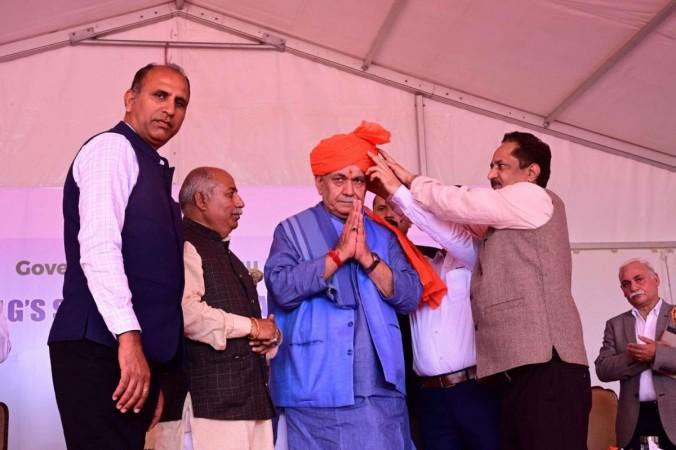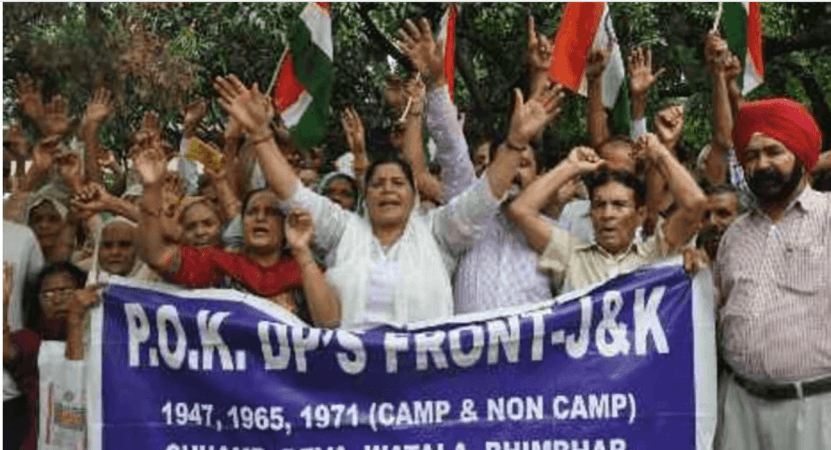Asserting that Pakistan-occupied Jammu and Kashmir (PoJK) is an integral part of India, Lieutenant Governor Manoj Sinha on Monday said that commitment made in the resolution unanimously passed in the Parliament will be fulfilled.
"PoJK is an integral part of India. The commitment made in Parliament regarding PoJK will soon be fulfilled by the blessings of Mata Vaishno Devi and Baba Amarnath," said the Lt Governor said while addressing LG's Special Governance Camp for displaced persons of PoJK at Sports Stadium, Bhour Camp at the outskirts of Jammu city.
The Lt Governor said the development of new J&K is incomplete without complete integration of PoJK displaced persons in the mainstream development.
"We are committed to ensuring the welfare and well-being of all so they can realize their true potential and contribute in nation building", he said.

"We had started outreach programmes in 2021 for displaced families of PoJK living outside UT so that no one is left behind in any welfare scheme", he said and added that the government was focusing on skilling, self-employment, social assistance, scholarships, sports, financial inclusion to aid economic development and financial stability.
What is Parliament's resolution on PoJK?
On February 22, 1994, both Houses of the Indian Parliament had unanimously adopted a resolution in which it was made clear that the whole of Jammu and Kashmir was an integral part of India, and that Pakistan must vacate parts of the State under its occupation.
On behalf of the People of India, firmly declares that -
The State of Jammu & Kashmir has been, is, and shall be an integral part of India and any attempts to separate it from the rest of the country will be resisted by all necessary means;
India has the will and capacity to firmly counter all designs against its unity, sovereignty, and territorial integrity; and demands that-
Pakistan must vacate the areas of the Indian State of Jammu and Kashmir, which they have occupied through aggression; and resolves that -
all attempts to interfere in the internal affairs of India will be met resolutely."
The Resolution was unanimously adopted. The Resolution is unanimously passed on February 22, 1994.

Smriti Bhawan in memory of PoJK martyrs.
The Lt. Governor said that the displaced families of PoJK have suffered a lot. "Prime Minister Narendra Modi understood their sufferings and made arrangements for their financial support and settlement", he said.
"We have organized this camp on the direction of the Prime Minister to saturate social security schemes, handholding of youth so they pursue their dreams of becoming entrepreneurs and ensuring that they can avail all facilities like other citizens. Steps will be taken to regularize the colonies of displaced families," said the Lt Governor.
The Lt Governor announced that the J&K Government will construct Smriti Bhawan in memory of the martyrs of PoJK.
"Every effort will be made to preserve and promote the culture and traditions of displaced families. The land has already been identified and soon the construction work will start, he announced.
The Lt Governor also paid homage to the brave civilians who were martyred in the October 1947 terror attack by Pakistan.
"We remember their supreme sacrifices and understand the pain and sufferings of displaced families. It is our responsibility to secure their rights and build an enabling environment to fulfill the aspirations of the young generation from the community", he observed.

Displaced persons from PoJK
After gruesome massacres in areas like Muzaffarabad, Mirpur, Kotli, and Poonch, which were parts of erstwhile princely J&K State, 31,619 Hindu and Sikh families had migrated to Jammu, leaving behind everything at their native places. The region called as PoJK was annexed by Pakistani authorities with the help of raiders on October 22, 1947.
Out of the total of 31619 families, who had migrated in 1947, 5300 families were shifted to other parts of the country, however, 26319 families are settled in the state, whose population is touching 9.5 lakhs.

















